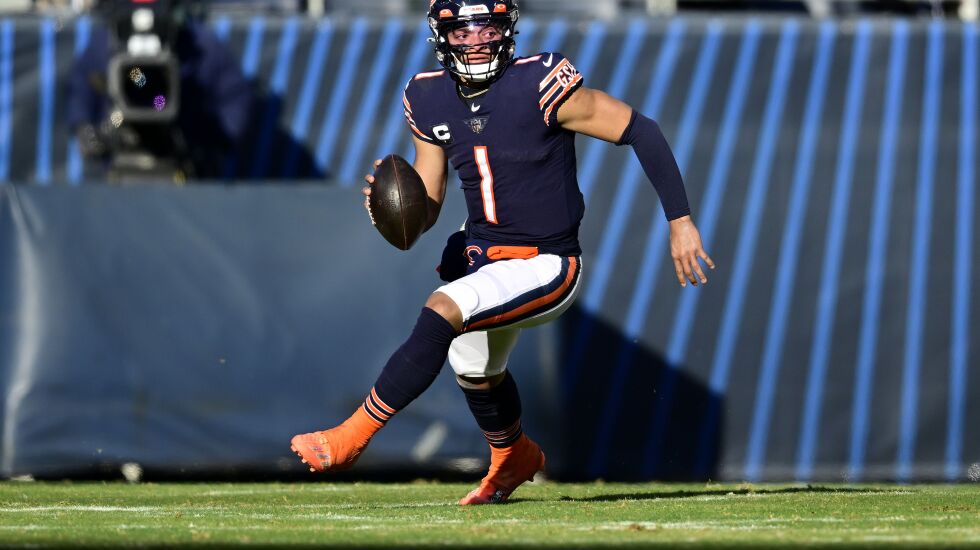
The Bears have bottomed out, not just in the wake of their 2018 run to the NFC North title but to one of the worst seasons in franchise history. If they lose to the Vikings on Sunday, their 3-14 record will outdo only their 1-13 mark in 1969.
It sounds horrible to sit through, but it hasn’t been. And that’s because of Justin Fields.
Amid the slog, including the current franchise-worst nine-game losing streak, Fields has been a bright spot. He wasn’t good enough overall to lift them out of the bottom tier of NFL offenses and he finished last in the league in yards passing, but he was electric. Fields is the most fun quarterback the Bears have had since the gutsy, boisterous Jim McMahon.
Fields’ big-play potential, mostly as a runner, made the season watchable. Games were worth your attention because of the ever-present possibility that he’d do something amazing.
He became just the third quarterback in NFL history to rush for 1,000 yards and set the single-game regular-season record for a quarterback by burning the Dolphins for 178 in November.
He had seven runs of 30-plus yards and seven completions that went for 40 or more.
It seemed impossible that the Bears would finish with this bad of a record unless Fields was a disaster, but that’s where they’ve arrived by having so little around him.
Fields still has a ways to go, but there’s no denying he has progressed.
Establishing himself as the NFL’s most overwhelming runner at the position is just one part of the equation, but it’s a big one. Matt Nagy never wanted him to run. Matt Eberflus and Luke Getsy were resistant at first, then realized they were taking away a strength.
Fields said he doesn’t plan on rushing for 1,000 yards every season and he probably shouldn’t, but there also shouldn’t be a negative connotation to proclaiming him an elite runner. That’s a great weapon.
The next step for him, though, is to make that a secondary weapon. To do that, he needs to become far more prolific as a passer.
Of the seven quarterbacks who have run for more than 400 yards this season, Fields is the only one who has gotten more than 26% of his total yardage output on the ground. Of his 3,385 combined yards rushing and passing, 33.8% came as a runner.
By contrast, MVP candidates Jalen Hurts of the Eagles and Josh Allen of the Bills have gotten 82.3% and 84.2%, respectively, of their totals by passing. Even in Lamar Jackson’s 2019 MVP season, he averaged 208.5 yards passing per game, and rushing accounted for 27.8% of his total yardage.
Fields leads all quarterbacks, and the Bears’ entire team, at 76.2 yards rushing per game, but sits last among NFL starters at 149.5 yards passing per game. His incredible agility and speed are integral, but he must tilt his game toward being a far more productive passer.
His passing output was low, but more efficient than what he showed as a rookie.
After a brutal first four games, Fields put up a 96.9 passer rating over the next 10. In that stretch, he completed 65.7% of his passes, averaged 169.6 yards passing per game and threw 14 touchdowns versus six interceptions.
That suggests growth. It also sparks a debate over how much of his paltry stats could be attributed to the Bears’ inadequate offensive line and skill players. Increases in talent at those spots would theoretically lead to increases in Fields’ production.
This is the last time growth will be good enough, though. Starting next season, when the Bears won’t be stripping their roster and prioritizing the future, he has to be simply good. If he’s still a thrilling playmaker, but can’t do it consistently enough to be one of the most productive quarterbacks in the NFL, that won’t get the Bears where they want to go.







